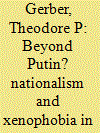| Srl | Item |
| 1 |
ID:
142994


|
|
|
|
|
| Summary/Abstract |
The role of nationalism within the Russian public is an under-examined but potentially important aspect of the crisis surrounding Russia's annexation of Crimea and its continuing involvement in eastern and southern regions of Ukraine. As commentators have sought to comprehend President Vladimir Putin's motives, many have asserted or assumed that such actions enjoy tremendous Russian public support. Indeed, public opinion polls from Russia indicate that Putin's popularity soared in the wake of the Crimean annexation and that large majorities have supported the government's policies in Ukraine, sympathizing with the Kremlin's negative portrayals of U.S. motives and actions.1 However, it is not clear whether this wave of public support is a fleeting “rally around the flag” phenomenon or the result of an organic, deeper tendency toward nationalism and xenophobia in the Russian public.
|
|
|
|
|
|
|
|
|
|
|
|
|
|
|
|
| 2 |
ID:
107051


|
|
|
|
|
| Publication |
2011.
|
| Summary/Abstract |
The article presents new survey research, sensitive to local understandings of key terms, that helps resolve a longstanding debate on whether Russian public opinion generally supports democracy or authoritarianism. The central conclusion is that while Russians differ amongst themselves, they are best understood not as autocratic but as generally supportive of a particular form of democracy that social scientists have called 'delegative democracy'. This logically consistent preference structure reconciles diverse arguments and findings in the literature, sheds light on Putin's puzzling decision to cede the presidency to Medvedev in 2008, and offers insight into the public opinion foundations of 'hybrid regimes'.
|
|
|
|
|
|
|
|
|
|
|
|
|
|
|
|